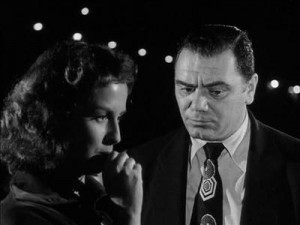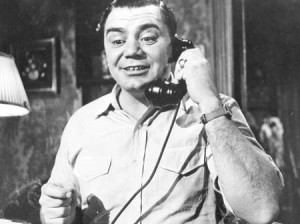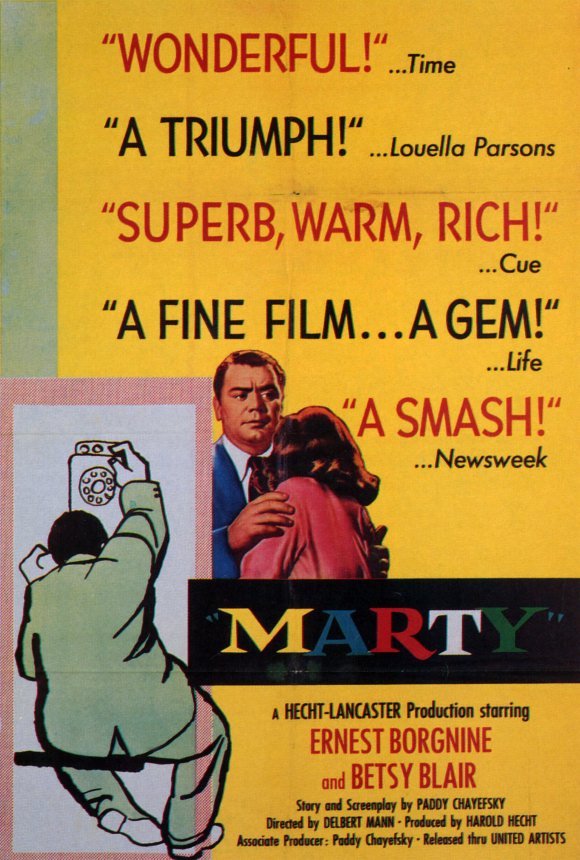
“Marty” tells the love story of a lonely bachelor-butcher from the Bronx (Ernest Borgnine), and Clara, a shy teacher (Betsy Blair), after they meet in a dance hall. Shot in the Bronx, its American-Italian locale was captured with attention to realistic detail.
But the script patronizes its “little” protagonists, an attitude demonstrated in a scene in which Marty tells Clara, “You’re not really as much of a dog as you think you are.”
Made on a low budget of $300,000, and with no big-name starts, Marty made an impression on Oscar voters, especially after winning the top award, the Palme d’Or, at the Cannes Film Fest.
Movie Impact
In 1959, Marty was sent to the Soviet Union as part of a cultural exchange program, during a brief thaw in the Cold War
Years later, the film served as inspiration for Sylvester Stallone’s “Rocky,” which won the 1976 Best Picture Oscar.
Seen from today’s perspective, Marty is an overrated film, claiming a style that could be described as sentimental realism, emphasizing the humanity of “little people.”
Chayefsky’s scenario was praised at the time, as an attempt to create poetry out of the humble, drab conversations of “ordinary people,” but, ultimately, it is repetitive ad condescending to its characters.
Detailed Plot
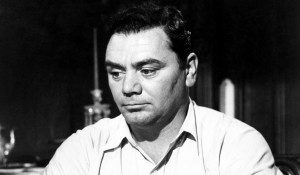 Marty Piletti (Borgnine), an Italian-American butcher who lives in the Bronx with his mother (Esther Minciotti), is a good-natured but socially awkward man faces under pressure to get married due to his age, 34. Marty has reluctantly resigned himself to bachelorhood due to failed love life, but he somehow maintains optimistic outlook on life, which he often describes as “Perfect!” or “Fantastic!”.
Marty Piletti (Borgnine), an Italian-American butcher who lives in the Bronx with his mother (Esther Minciotti), is a good-natured but socially awkward man faces under pressure to get married due to his age, 34. Marty has reluctantly resigned himself to bachelorhood due to failed love life, but he somehow maintains optimistic outlook on life, which he often describes as “Perfect!” or “Fantastic!”.
Harassed by his mother to go to the Stardust Ballroom on Saturday night, Marty meets Clara (Betsy Blair), a plain schoolteacher who is quietly weeping on the roof after being callously abandoned by her blind date. Spending the evening together dancing, walking and talking in a diner, Clara and Marty share their experiences and expectations.
Marty brings Clara to his house, and they express their mutual attraction. Delighted with his new-found love, he takes her home by bus, and promises to call the next afternoon. Excited, he punches the bus stop sign and weaves between the cars.
Things change when his cranky widowed aunt moves in, warning his mother that living alone, when children marry, is her fate. Fearing that Marty’s romance would lead to her abandonment, his mother belittles Clara. Marty’s friends, too, deride Clara for being plain and try to convince Marty to forget her and to remain with them. The insecure Marty doesn’t call Clara.
That night, back with his male friends, Marty realizes that he is giving up a chance of love with a woman. Despite objections of his friends, he calls Clara, who is watching TV with her parents. When friend asks what he’s doing, Marty proclaims:
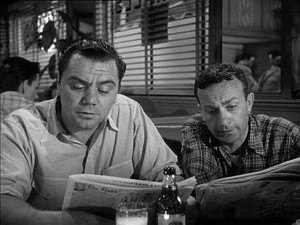 You don’t like her, my mother don’t like her, she’s a dog and I’m a fat, ugly man! Well, all I know is I had a good time last night! I’m gonna have a good time tonight! If we have enough good times together, I’m gonna get down on my knees and I’m gonna beg that girl to marry me! If we make a party on New Year’s, I got a date for that party. You don’t like her? That’s too bad!
You don’t like her, my mother don’t like her, she’s a dog and I’m a fat, ugly man! Well, all I know is I had a good time last night! I’m gonna have a good time tonight! If we have enough good times together, I’m gonna get down on my knees and I’m gonna beg that girl to marry me! If we make a party on New Year’s, I got a date for that party. You don’t like her? That’s too bad!
In the film’s last line, Marty tentatively says “Hello… Hello, Clara?”.
Oscar Nominations: 8
Picture, produced by Harold Hecht
Director: Delbert Mann
Screenplay: Paddy Chayefsky
Actor: Ernest Borgnine
Supporting Actress: Betsy Blair
Supporting Actor: Joe Mantell
Cinematography (b/w): Joseph LaShelle
Art Direction-Set Decoration (b/w): Edward S. Haworth and Walter Simonds; Robert Priestley
Oscar Awards:
Picture
Director
Screenplay
Actor
Oscar Context
In 1955, the most nominated (9) film was “The Rose Tattoo,” based on Tennessee Williams play and directed by the other Mann, Daniel. Most of the nominated pictures were screen adaptations of popular stage or TV plays. The other three nominees were the romantic melodrama “Love Is a Many-Splendored Thing” John Ford’s “Mister Roberts,” and “Picnic.”
